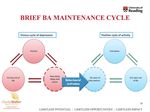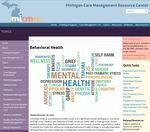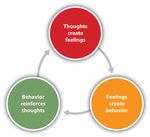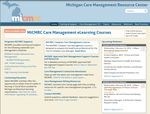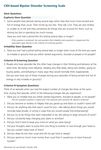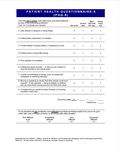Depression and Primary Care - December 12, 2018 - Michigan Institute for Care Management ...
←
→
Page content transcription
If your browser does not render page correctly, please read the page content below
MiCMRC Care Management Educational Webinar: Depression and Primary Care Expert Presenter: Sarah Fraley, LMSW Intermediate Project Manager MiCMRC
Objectives • Define symptoms of depression • Distinguish between different types of depression • Apply 2 intervention strategies to use with patients who have depression
Depression There is no point treating a depressed person as though she were just feeling sad, saying, 'There now, hang on, you'll get over it.' Sadness is more or less like a head cold- with patience, it passes. Depression is like cancer.” ― Barbara Kingsolver, The Bean Trees https://www.goodreads.com/quotes/tag/depression
Why are we talking about depression? Depression diagnoses increased 33% since 2013, according to BCBS analysis of the 41 million people it insures. – Major depression can result in severe impairments that interfere with or limit one’s ability to function in every day life, (including the management of other health conditions). – Depression is the leading cause of disability worldwide – At a global level, over 300 million people are estimated to suffer from depression – 4.4% of the world’s population https://www.nimh.nih.gov/health/statistics/major-depression.shtml https://www.bcbs.com/the-health-of-america/reports/major-depression-the-impact-overall-health http://www.who.int/mental_health/management/depression/en/
BCBS Depression Data https://www.bcbs.com/the-health-of-america/reports/major- depression-the-impact-overall-health
Depression as of 2016 https://www.bcbs.com/the-health-of-america/reports/major-depression-the-impact-overall- health
Depression as of 2016 https://www.nimh.nih.gov/health/statistics/major-depression.shtml
Depression as of 2016 https://www.nimh.nih.gov/health/statistics/major-depression.shtml
Depression and adolescents https://www.nimh.nih.gov/health/statistics/major-depression.shtml
Depression - defined
• The cardinal symptoms of depression include:
– Low, sad, or depressed mood (persistent)
– Loss of interest or pleasure in activities that were previously enjoyable
Other symptoms include:
– Feelings of hopelessness, or pessimism
– Irritability
– Feelings of guilt, worthlessness, or helplessness
– Decreased energy or fatigue
– Moving or talking more slowly
– Feeling restless or having trouble sitting still
– Difficulty concentrating, remembering, or making decisions
– Difficulty sleeping, early-morning awakening or oversleeping
– Appetite or weight changes
– Thought of death or suicide, suicide attempts
– Aches or pains, headaches, cramps, or digestive problems without a clear physical
cause and/or that do not ease even with treatmentSuicide as of 2016 • Suicide is the 10th leading cause of death • Suicide is the 2nd leading cause of death among individuals between the ages of 10 -34 • There are more than 2x as many suicides, (44,965) in the United States as there are homicides, (19,362) https://www.nimh.nih.gov/health/statistics/suicide.shtml
https://www.cdc.gov/injury/wisqars/pdf/leading_causes_of_death_by_age_group_2016-508.pdf
Depression • “That's the thing about depression: A human being can survive almost anything, as long as she sees the end in sight. But depression is so insidious, and it compounds daily, that it's impossible to ever see the end.” ― Elizabeth Wurtzel, Prozac Nation https://www.goodreads.com/quotes/tag/depression
Types of Depression • Persistent Depressive Disorder, (Dysthymia) • Postpartum Depression • Seasonal Affective Disorder • Bipolar Disorder
Subsyndromal Symptomatic
Depression
• A person’s depression symptoms don’t quite
meet the criteria for a diagnosis of depression
• A person with SSD has two or more symptoms
of depression present for two weeks or more
and have caused social dysfunction, such as
isolation, withdrawal, or behavior changes.
• SSD symptoms may be a risk factor for
developing clinically significant depression in
the futureIn Primary Care…. 60% of patients with depression show up in a Primary Care office for usual care
Why relate depression to primary
care?
• 50% of all mental health care is delivered by
primary care providers
• 50% of patients with depression go
undetected in usual primary care
• 1/3 to ½ of patients referred to mental health
specialists do not attend the first appointment
https://www.pcpcc.org/content/benefits-integration-behavioral-healthHow do we know when someone is
depressed?
• Screening for depression
– The Care Manager as well as other team
members, is in a unique position offering the
opportunity to screen for depression
– Some primary care environments have started
doing this as a part of routine carePHQ -2 Over the past 2 Not At All Several Days More Than Nearly every weeks, how Half the Days day often have you been bothered by any of the following problems? 1. Little interest 0 1 2 3 or pleasure in doing things 2. Feeling 0 1 2 3 down, depressed or hopeless
http://micmrc.org/system/files/11.7-PHQ9.pdf
PHQ-9 Score Depression severity Suggested Intervention
0-4 None-minimal None
5-9 Mild
PHQ-9 Repeat PHQ-9 at
follow-up
• The total of all 9 responses from the PHQ 9
Make treatment plan,
aim to predict the
10-14 severity of depression
Moderate
consider counseling,
follow-up, and/or
prescription drugs
Consider prescription
15-19 Moderately Severe
drugs and counseling
Prescribe prescription
drugs. If there are poor
responses to
treatment,
20-27 Severe
immediately refer the
patient to a mental
health specialist for
counseling.
https://www.health.ny.gov/health_care/medicaid/redesign/dsrip/docs/2016-07-01_phq_2_and_9_clean.pdfPHQ 9 Guidelines • The Michigan Quality Improvement Consortium Clinical Practice Guideline Update indicates that an adequate response to treatment is a 50% reduction in score with remission being a total score of
PHQ - 9
• Critical Considerations
– Perform suicide risk assessment in patients who
respond positively to item 9 “Thoughts that you
would be better off dead or of hurting yourself in
some way.” Follow the policies and procedures in
place at your practice.
– Rule out Bipolar DisorderSuicide Risk Assessment Download this card and additional resources at www.sprc.org or at www.stopasuicide.org
http://www.cqaimh.org/pdf/tool_cidi.pdf
Depression Screening • Screening should be implemented with adequate systems in place to ensure an accurate diagnosis, effective treatment, and appropriate follow up
Depression and Chronic Illness https://www.ncbi.nlm.nih.gov/pmc/articles/PMC3733529/
Depression • “Mental pain is less dramatic than physical pain, but it is more common and also more hard to bear. The frequent attempt to conceal mental pain increases the burden: it is easier to say “My tooth is aching” than to say “My heart is broken.” ― C.S. Lewis, The Problem of Pain https://www.goodreads.com/quotes/tag/depression
Depression and Diabetes • Patients with type 1 or type 2 diabetes are at an increased risk of developing depression • Depression may lead to life style behaviors that increase the risk for diabetes
Self-Care Activities • The steps an individual can take to address both diabetes and depression are similar and can help each illness. – Getting regular exercise – Getting enough “good” sleep – Following a proper nutrition plan – Reducing or stopping the use of alcohol and drugs – Building a social support network
Therapeutic relationship • The quality of the therapeutic relationship between patient and provider is shown to be more valuable than the treatment modality used to address depression. https://www.psychologytoday.com/us/blog/compassion-matters/201612/the- importance-the-relationship-in-therapy
Interventions for Primary Care • CBT, (Cognitive Behavioral Therapy) • Problem Solving • Behavioral Activation • Distress Tolerance • Interpersonal Therapy • Motivational Interviewing
CBT
How people think in specific situations
affects how they feel emotionally &
physically
and how they behaveCognitive Distortions
• All or None Thinking (you see things in black-or-white
categories. If a situation falls short of perfect, you see it
as a total failure. Ex. Eating a spoonful of ice cream when
on a diet and telling yourself, “I’ve blown my diet
completely.” I am either a success or a total failure
• Emotional Reasoning: Assuming that negative
emotions necessarily reflect the way things are. Ex. “I
feel terrified about flying. Therefore it must be very
dangerous to fly.” or
“ I feel angry. This proves I’m being treated
unfairly.”CBT :
Emotion or Negative Evidence Evidence Alternative Emotion or
Feeling automatic that that does thought Feeling
thought supports not support
the the thought
thought
Sadness I’m going to end My uncle had Many people I am working Relief
Overwhelmed up losing a limb his foot with diabetes hard to be
or go blind amputated never lose a limb healthy and can
or go blind continue to do
thing to prevent
my diabetes
from getting
that bad
I hear about I take better care Hopefulness
people who go of myself than
blind my uncle does
My A1C is better
this month than
last
I am working on
my eating habitsBehavioral Activation • A short term behavior change approach for decreasing depressive symptoms • When people get depressed, they may increasingly disengage from their routines and withdraw from their environment
Behavioral Activation https://positivepsychologyprogram.com/behavioural-activation-therapy- treating-depression/
Quick Tools • Have patient complete a daily activity log, (what are they doing now) • Have patient write down activities they would like to do based on life areas that are most important to them (use brain storming and write down immediate activities such as calling a family member, and more long range activities like making a photo album) • Have patients rank activities by number, easiest to hardest to complete • Incorporate the activity into the care plan
Behavioral Activation https://steemit.com/phsychology/@angelaries/depression-therapies-to-get-rid-of-your- depressive-disorder-today
Responses to Depression
Healthy Not so healthy
Seek out a trusted friend Using alcohol or drugs
Continue taking medication Overeating
Call PCP/Care Manager/Behavioral Health Isolating/withdrawing
Specialist
Meditate/Pray Not taking prescribed medication/not
checking blood sugars
Walk the dog / walk to the kitchen Staying in bed
Write in a journal Suicidal thinking/planning
Read an inspirational book Not going to school or workCosts and Benefits of Responses
My Response to Positive Effects Negative Effects Impact on my
Depressive (Benefits or (Costs or Personal Values
Thinking Upsides) Downsides) and Life Goals
Healthy Response Exercise is a stress I may be tired. I Walking helps me
Example: reliever for me and may not make it work towards my
Go for a 15 minute I like being outside and this may make life goal of losing
walk and experiencing me feel worse. weight.
the change in
sceneryCosts and Benefits of Responses
My Response to Positive Effects Negative Effects Impact on My
Depressive (Benefits or (Costs or Personal Values
symptoms Upsides) Downsides) and Life Goals
Not So Healthy I get to sleep in I could get fired for Missing work is not
Response longer and watch not being in line with my
Skip work television in bed all responsible and value of providing
day getting my work for my grandson
done and it could keep
me from achieving
my goal of paying
for his collegeCare plan goal ideas… Increase support network: • Call or text at least 2 people during the week for at least 3 weeks Increase activity: • Walk to the kitchen from the living room 1x/day for at least 2 weeks
Personal Action Plan Wallet Card
ACTION PLAN FOR DEPRESSION
Triggers: Responses “to do”
__________________________________ __________________________________
__________________________________ __________________________________
__________________________________ __________________________________
Key early warning signs: Responses “not to do”
__________________________________ __________________________________
__________________________________ __________________________________
__________________________________ __________________________________
Provider:_______________________
Phone: ________________________
Support Person:_________________
Phone:_________________________What to consider when patients start a
new psychiatric medication
• Educate patients on the initial side effects that may occur during
the first week or so:
nausea
headache
initial jitteriness
insomnia
• Call patient 1-2x during the first week of starting a medication or
changing a medication
• Remind patients that it may take 6-8 weeks for a medication to take
a noticeable effect
• Continue frequent contact to assess patient’s adjustment,
determine any other side effects and ultimately if the patient is
noticing improvementCommunity Behavioral Health
Referrals
• How do you refer to counseling
www.psychologytoday.com
• Psychiatrist when everyone is full
• Clinic with free/reduced cost services
• On-line resources
• University of Michigan Depression Center Toolkit,
https://www.depressioncenter.org/depression-
toolkit
• Difficulty in rural communitiesDepression • “There are wounds that never show on the body that are deeper and more hurtful than anything that bleeds.” ― Laurell K. Hamilton, Mistral's Kiss https://www.goodreads.com/quotes/tag/depression
MiCMRC
Behavioral Health Topic Page
https://micmrc.org/topics/behavioral
-healthReferences
• Weisberg, R.R., & Magidson, J.F. (2014, August). Integrating cognitive behavioral therapy into
primary care settings. Cognitive and Behavioral Practice, 21(3) 247-251
• Legg, T.J., (2018, July). What does depression look like? Medial News Today, Newsletter.
Retrieved from https://www.medicalnewstoday.com/articles/314071.php
• Winch, G. (2015, October). The Important Difference Between Sadness and Depression.
Psychology Today. Retrieved from https://www.psychologytoday.com/us/blog/the-squeaky-
wheel/201510/the-important-difference-between-sadness-and-depression
• Ng, C.W.M, How, C.H, & NG, Y.P,. (2017). Managing depression in primary care. Sinapore
Medical Journal, (58)8 459-466
• https://www.bcbs.com/the-health-of-america/reports/major-depression-the-impact-overall-
health
• The Importance of the Therapeutic Relationship. Lisa Firestone PhD, (12/22/2016) retrieved
from, https://www.psychologytoday.com/us/blog/compassion-matters/201612/the-
importance-the-relationship-in-therapy
• Behavioural Activation: Behavioural Therapy for Depression Treatment, (02/26/2018)
retrieved from, https://positivepsychologyprogram.com/behavioural-activation-therapy-
treating-depression/Contact Information Sarah Fraley, LMSW MiCMRC svoor@umich.edu micmrc-requests@med.umich.edu
You can also read

